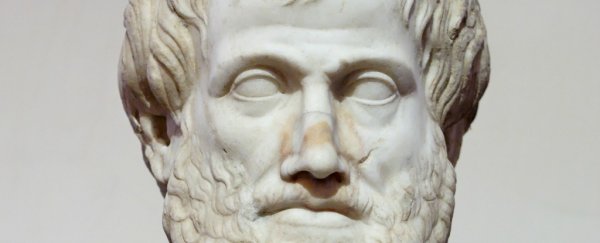Aristotle - the father of modern logic and Plato's most famed pupil - died way back in 322 BC. Since then, his works have been canonised and taught in classrooms across the world (remember having to read Poetics and Politics? Good times). There's just one weird problem: we actually have no idea where he was buried.
Needless to say, archaeologists have been searching for Aristotle's tomb for what seems like forever. After all, he's been dead for 2,228 years, and there's been no trace - until now. One Greek archaeologist says he might have finally found the long-lost tomb in the ancient village of Stagira.
According to Niki Kitsantonis for The New York Times, archaeologist Konstantinos Sismanidis has been leading a two-decades-long dig in Northern Greece, and says that Aristotle's remains might lie in a structure buried beneath Stagira - the same village where the famed thinker was born.
The announcement came during the Aristotle 2400 Years World Congress held by scholars to celebrate Aristotle's 2,400th birthday in Thessaloniki, Greece. During his talk, Sismanidis said he had "no proof, but strong indications, as certain as one can be", that he had found the philosopher's resting place, reports Kitsantonis.
This means that Sismanidis doesn't have any hard evidence to go by yet, but he says the tomb's location in Stagira, its marble floor, panoramic view and date of construction - at the beginning of the Hellenistic Period that started in 323 BC, a year before Aristotle's death - provides enough circumstantial evidence to draw an early conclusion.
"We had found the tomb," he said in The New York Times report. "We've now also found the altar referred to in ancient texts, as well as the road leading to the tomb, which was very close to the city's ancient marketplace within the city settlement."
While we will need to wait for a full-blown analysis to know for sure, this is one of the best prospective sites researchers have had for years. According to Alexandra Ma for The Huffington Post, researchers once thought Aristotle was buried in Chalcis, a city that is roughly 300 miles (482 km) away from Stagira.
This hypothesis was based largely on the fact that the philosopher fled from Athens to Chalcis in 322 BC to escape charges of impiety. While on the run, he contracted a stomach disease and died. It's still accepted that he did die in Chalcis, but his remains could have been moved afterwards.
According to the new report, it's likely his family returned him to the place of his birth.
It's definitely an exciting time for archaeologists and Aristotelian scholars. Further investigation of the tomb will hopefully unveil more details about whether or not Aristotle's remains - likely in the form of ashes - are housed there.
Check out this video to see Sismanidis talk about his discovery:

